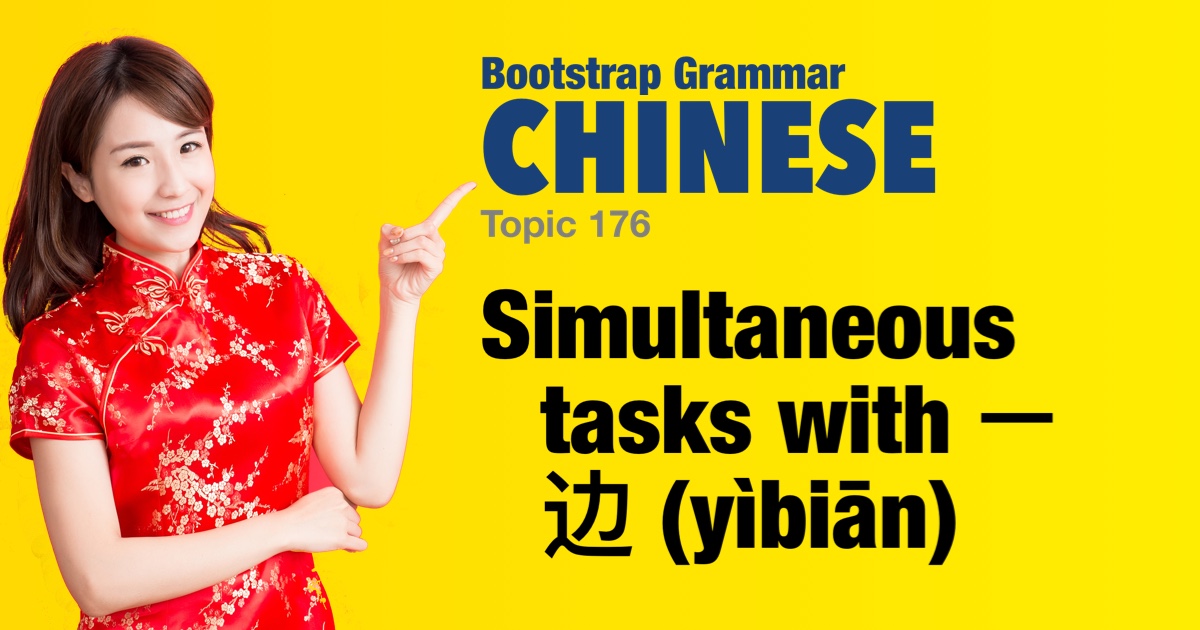Chinese grammar - Simultaneous tasks with 一边 (yìbiān) |
|||
|
|||
The word 一边 (yìbiān) is used in Chinese to indicate that two actions are happening simultaneously. — It is similar to using 'while' or 'as' in English. The pattern is: 一边 + [verb 1] + 一边 + [verb 2]. |
| Examples: | |
|
他一边听音乐,一边做作业。
tā yìbiān tīng yīnyuè,#yìbiān zuò zuòyè. He listens to music and does his homework. |
|
|
我很少一边吃饭,一边看电视。
wǒ hěn#shǎo yìbiān chīfàn,#yìbiān kàn diànshì. I rarely eat and watch TV at the same time. |
|
|
她从不一边开车,一边打电话。
tā cóng#bù yìbiān kāichē,#yìbiān dǎ diànhuà. She never talks on the phone while driving. |
|
|
我们喜欢一边走路,一边聊天。
wǒmen xǐhuān yìbiān zǒulù,#yìbiān liáotiān. We like to walk and talk at the same time. |
|
|
他总是一边看报纸,一边喝咖啡。
tā zǒngshì yìbiān kàn bàozhǐ,#yìbiān hē kāfēi. He always reads the newspaper and drinks coffee. |
|
|
我妹妹一边写信,一边听广播。
wǒ mèimei yìbiān xiě xìn,#yìbiān tīng guǎngbō. My sister was writing letters and listening to the radio.
|
|
|
我妈妈一边听音乐,一边做晚饭。
wǒ māma yìbiān tīng yīnyuè,#yìbiān zuò wǎnfàn. My mother was listening to music and cooking dinner. |
|
|
我弟弟喜欢一边跑步,一边听播客。
wǒ dìdi xǐhuān yìbiān pǎobù,#yìbiān tīng bōkè. My brother likes to listen to podcasts while running.
|
|
|
我同事一边工作,一边讨论项目。
wǒ tóngshì yìbiān gōngzuò,#yìbiān tǎolùn xiàngmù. My colleagues were working and discussing projects at the same time. |
|
|
我会一边看书,一边记笔记。
wǒ huì yìbiān kànshū,#yìbiān jì bǐjì. I will read a book and take notes at the same time. |
|
|
他们一定会一边学习新词汇,一边看报纸。
tāmen yídìng huì yìbiān xuéxí xīn cíhuì,#yìbiān kàn bàozhǐ. They will definitely learn new vocabulary while reading the newspaper.
|
|
|
度假时,他们一边拍照,一边欣赏风景。
dùjià shí,#tāmen yìbiān pāizhào,#yìbiān xīnshǎng fēngjǐng. During (their) vacation, they took photos while admiring the scenery.
|
|
|
不要一边学习,一边说话!
búyào yìbiān xuéxí,#yìbiān shuōhuà! Don’t study and talk at the same time! |
|
|
谁在一边洗澡,一边唱歌?
shéi zài yìbiān xǐzǎo,#yìbiān chànggē? Who is taking a shower and singing at the same time? |
|
 |
|



